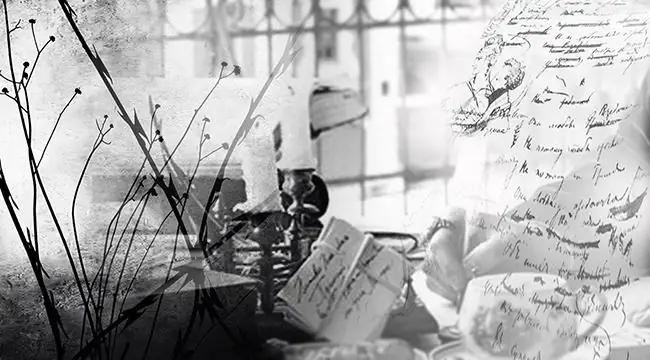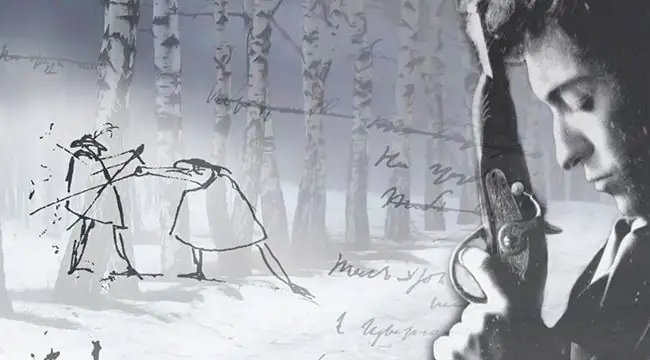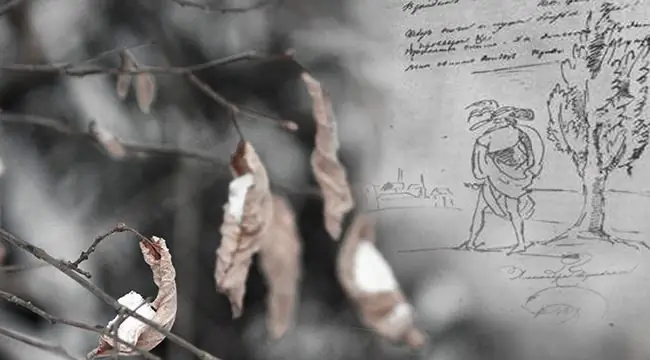- Author Adrian Jeff jeff@psychologosportal.com.
- Public 2023-12-17 05:06.
- Last modified 2025-01-24 14:09.
A. S. Pushkin. Duel: "But the whisper, the laughter of fools …". Part 11
On that very day, an angry letter was sent by Pushkin to Baron Heeckeren: “Like the old pimp, you lay in wait for my wife in all corners to tell her about the love of your so-called son; and when, sick with syphilis, he stayed at home, you said that he was dying of love for her …"
Part 1 - Part 2 - Part 3 - Part 4 - Part 5 - Part 6 - Part 7 - Part 8 - Part 9 - Part 10
New Year's Eve, 1837. The Vyazemskys have a great evening. Dantes with Ekaterina Goncharova, Pushkin with his wife. Family idyll outside, hell inside. NN rushes about, not knowing how to behave with Dantes, she is "sometimes too frank, sometimes too restrained." Pushkin, on the other hand, looked such that Countess Stroganova confessed: if she were in N. N.'s place, she would not have dared to return home with him. On that very day, an angry letter was sent by Pushkin to Baron Heeckeren: “Like the old pimp, you lay in wait for my wife in all corners to tell her about the love of your so-called son; and when, with syphilis, he stayed at home, you said that he was dying of love for her …"

Everything that happened next was of little interest to Pushkin. He did not even look for a second for himself, but accidentally meeting a lyceum friend K. Danzas, he simply asked him to witness one conversation. Danzas immediately went with Pushkin to the French embassy, where, to his surprise, he learned about the essence of the matter. "Here is my second!" - Pushkin introduced his friend to Dantes' second, the embassy secretary, D'Arshiyac. Danzas is the kindest person, but he would never have been able to upset a duel or somehow disobey Pushkin's will.
Well, start? - Let's start, perhaps …
On the day of the duel, Pushkin was completely calm. He walked around the room, sang songs, then went with Danzas for pistols. An hour before going to shoot, AS was busy with his Sovremennik, wrote to AO Ishimova, who worked for the magazine: “I am extremely sorry that it will be impossible for me to appear today at your invitation …”
Wolf went to a meeting with Danzas on the corner of Nevsky Prospect, merry, drinking his favorite lemonade. From there we went to the Black River. On the way, we met surprisingly many acquaintances, and met NN, "but she was short-sighted, and Pushkin was looking the other way."
Indifferent to any ceremony, Pushkin behaved completely indifferently during the duel.
Only once asked if soon.
And aim at the thigh or at the temple
Pushkin is a wonderful shooter, and Dantes knows it. AS's wish “the bloodier the better” is fulfilled - they shoot from 10 steps. Each will take five steps along the territory of choice - to give the enemy a chance or to kill for sure.

Pushkin chooses the temple of Dantes. The poet, calm in mortal combat, reaches the barrier and takes aim. The temple is merciful, it is immediately. The temple is almost like an ace of cards, where A. S. falls from ten steps. Icy calmness of urethral courage and total concentration in sound. The answer, as before, as in eternity, is no. Genius and villainy are two incompatible things.
D'Anthes, who has become faint, fires without reaching the barrier and without taking aim. The bullet penetrates Pushkin into the right iliac region and, crushing the pelvic bone, stops in its fragments. After that, the poet lived for another 46 hours in inhuman torment.
I've been in thirty battles. I have seen many people die, but have seen few of the kind. (N. F. Arendt, physician of Nicholas I)
Pushkin knew about the severity of his wound, he was in a hurry to put things in order, said goodbye to friends, children, wife. The poet's grief was constant about his beloved: "She, poor, endures innocently and can still endure in human opinion." He was also worried about the fate of K. Danzas: "Ask for him, he is my brother."
Pushkin was dying unpretentiously, he did not scream from inexpressible pain, only moaned occasionally, spared his loved ones. Everyone who did something for him, even the smallest thing - straightening a pillow or bringing water, was invariably grateful: "That's great, that's good." Friends asked not to shoot for him with Dantes. But even those who did not know this will would never have called Dantes-Heeckeren. The duel is the privilege of noble people.
On January 29, 1837, at 14:45, Doctor Andreyevsky closed the eyes of the deceased.

At the suggestion of the shocked M. Yu. Lermontov, it is customary to see Pushkin as a victim of unfortunate circumstances, almost a conspiracy. This is not true.
A. S. Pushkin is an amazing example of freedom from any circumstances, opinions, actions, considerations of benefit and benefit. Throughout his life, the poet tried to build according to one or another ranking, and no one has ever been able to limit his urethral impetuosity, courage, courage, contempt for death, love of the will and willingness to give his life for the confirmation of these values in our collective mental.
Pushkin's “Holy Liberty” is a powerful contribution to the urethral-muscular mentality of Russia. Generations have gone, social formations have sunk into oblivion, but the metronome of Pushkin's lines still sets the rhythm for hearts for which Russia is not an empty sound. The knowledge gained at the training "System-Vector Psychology" by Yuri Burlan, this universal decoder of the mental unconscious, makes it possible to read and rediscover Pushkin in the original source, without the mediation of old cliches and other people's gags.
In the recent film by F. Bondarchuk "Stalingrad" in a house destroyed by the Nazis, a portrait of the poet with an invisible veil covers a handful of people in the hell of war. As long as A. S. Pushkin is here, it is possible to survive - no matter what.
Sources:
1) A. S. Pushkin. Collected works in six volumes. - M.: Pravda, 1969.
2) V. Veresaev. Pushkin in Life: A Systematic Collection of True Testimonies of His Contemporaries; Pushkin's companions - M.: Astrel: AST, 2011.
3) M. Davidov. Duel and death of A. S. Pushkin through the eyes of a modern surgeon. Electronic resource:
4) N. Dolinina. Let's read Onegin together. - SPb.: DETGIZ-Lyceum, 2005.
5) Pushkin without gloss (comp. And introductory article by P. Fokin) - St. Petersburg: Amphora, TID Amphora, 2009.
6) Yu. Lotman. Pushkin, St. Petersburg: Art-St. Petersburg, 1995, 2003. Electronic resource:
Previous parts:
Part 1. "The heart lives in the future"
Part 2. Childhood and Lyceum
Part 3. Petersburg: "Unrighteous Power Everywhere …"
Part 4. Southern link: "All pretty women have husbands here"
Part 5. Mikhailovskoe: "We have a gray sky, and the moon is like a turnip …"
Part 6. Providence and conduct: how the hare saved the poet for Russia
Part 7. Between Moscow and St. Petersburg: "Will I soon be thirty years old?"
Part 8. Natalie: “My fate is decided. I am getting married"
Part 9. Kamer-junker: "I will not be a slave and a buffoon with the king of heaven"
Part 10. The last year: "There is no happiness in the world, but there is peace and will"






